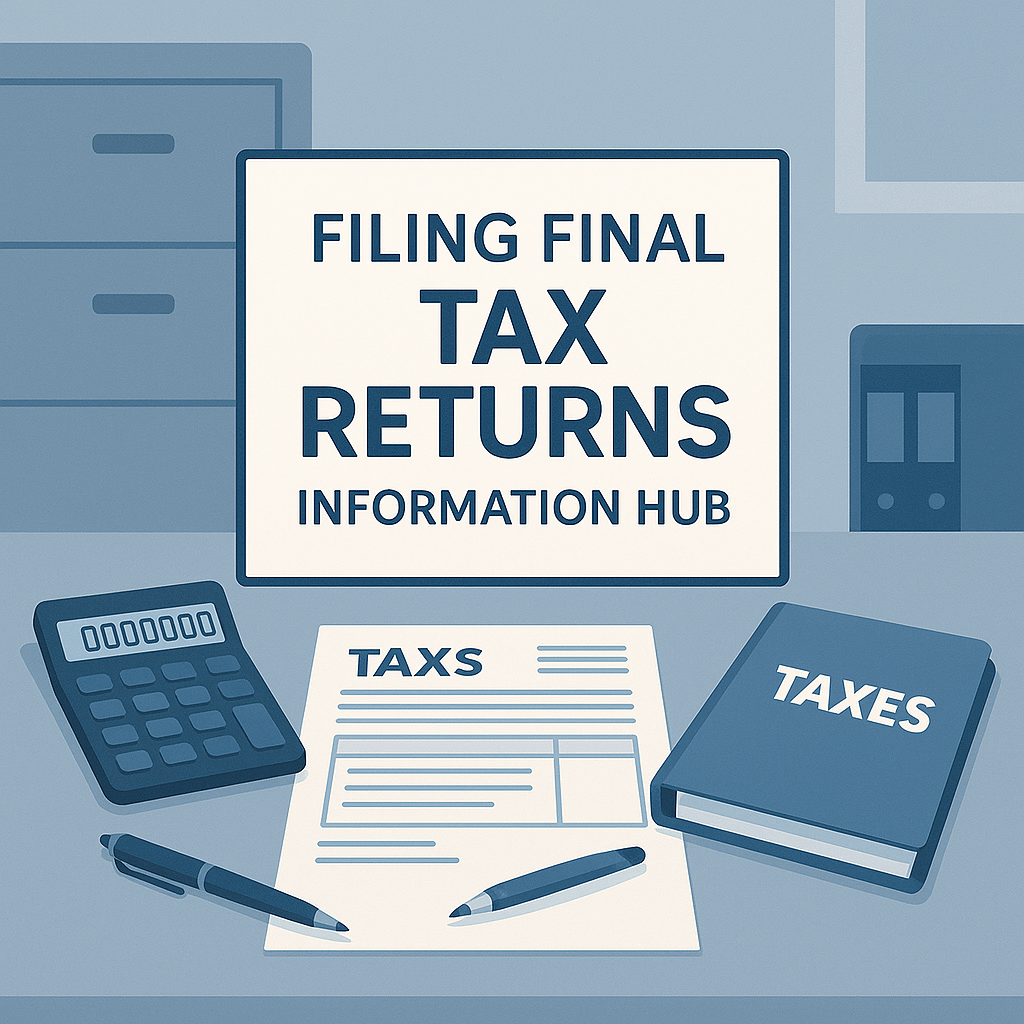Yes, the IRS still expects a final return.
The Filing Final Tax returns Information Hub
When someone dies, their tax obligations don’t end automatically. A final income tax return must be filed for the year of death, and in some cases, an estate tax return may also be required. This hub helps you understand what’s required, when it’s due, and how to gather the information you’ll need. Whether you’re an executor, surviving spouse, or family member, we’ll walk you through the process so nothing falls through the cracks.

Key Things To Know
Filing taxes after someone’s death comes with special rules. Here’s what to understand before you begin.
- The IRS requires a final income tax return: A personal federal return (Form 1040) must be filed for the deceased person for the year they died, covering income earned up to the date of death.
- You may also need to file an estate income tax return: If the estate earns more than $600 in gross income after the date of death (from interest, dividends, rental income, etc.), the executor must file IRS Form 1041.
- Filing status depends on marital status and timing: If the person was married, the surviving spouse may be able to file a joint return for that year. If they were unmarried, the return is filed as Single or Head of Household depending on their situation.
- Only certain people can sign and submit the return: An appointed executor or court-authorized personal representative signs the return. If no executor has been appointed, a surviving spouse may file a joint return and write “filing as surviving spouse.”
- State returns may also be required: Most states require a final return, too. Check your state’s tax authority for forms and deadlines, which may differ from federal timelines.
- The final tax return is not the same as inheritance and estate tax: They are three different types of taxes that come into play at different stages and for different reasons.
How to File a Final Tax Return
Here’s a step-by-step guide for preparing and submitting the final income tax return after someone dies.
- Gather the necessary tax document: You’ll need W-2s, 1099s, brokerage statements, Social Security year-end summaries, and any other income or deduction-related paperwork for the year of death.
- Get legal authority to act: You must be the executor or personal representative of the estate, or the surviving spouse, to sign and submit the return.
- Complete IRS Form 1040 for the year of death: Fill out the return as you would for any taxpayer. Be sure to check the box indicating that the taxpayer is deceased and write “Deceased” along with the date of death at the top of the form.
- Include IRS Form 1310 if you are due a refund and are not the spouse: This form is required if someone other than the spouse is filing and expects a refund. It tells the IRS who is legally allowed to receive it.
- File IRS Form 1041 if the estate earned income after death: If the estate itself receives income (from bank interest, real estate, etc.), a separate tax return for the estate is required using IRS Form 1041. This return may also need to be filed in subsequent years.
- Check state requirements and file the state return: Most states require a separate return for the deceased. Deadlines, forms, and tax laws vary by state.
- Keep copies of everything for the estate’s records: Store all filed returns, supporting documents, and correspondence in your CLEAR Kit or estate binder for future reference and potential audits.
Articles
Frequently Asked Questions
Filing taxes after someone dies can feel confusing, especially if you’ve never done it before. These common questions can help clarify what to expect and how to move forward.
Disclaimer: The information provided on this website and by Buried in Work is for general informational purposes only and should not be considered legal advice. Please consult with a qualified attorney or subject matter expert for advice specific to your situation.




